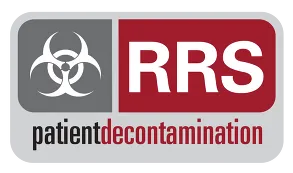
The High Cost of Decontamination Failures: How Hospitals Can Avoid Disaster
Picture this: it’s a quiet night in November 2014, and a valve pops at DuPont’s plant in La Porte, Texas, spewing 23,000 pounds of methyl mercaptan—a nasty chemical that smells like rotten eggs and can kill you quick.
Four workers die, and nearby Houston-area hospitals brace for impact. One of these hospitals was caught flat-footed, with staff unsure how to decon exposed patients rolling in from the chaos. Gear was scrambled, protocols were shaky, and it was a mess until they got a grip.
The best hospitals don’t let that happen—they’ve got readiness locked down, often with pros who’ve seen the worst.
This isn’t an isolated case. According to the Massachusetts Department of Public Health, hospitals that fail to maintain proper decontamination procedures risk secondary contamination, emergency department closures, and significant liability exposure.
To help hospitals avoid these costly mistakes, this article examines real-world decontamination failures, their consequences, and how hospitals can safeguard themselves with better protocols and outsourcing solutions.
The True Cost of Decontamination Failures
When hospital decontamination programs are inadequate, the financial, operational, and reputational damage can be staggering. Here’s what hospitals risk:
1. Legal Liability & Lawsuits
Failure to follow proper decontamination procedures can lead to patient harm and legal action. In the case of Porter Adventist, multiple lawsuits were filed, and the hospital’s legal costs skyrocketed.
Hospitals that don’t maintain rigorous compliance with OSHA, NFPA, and The Joint Commission risk fines exceeding $70,000 per violation, as well as potential medical malpractice claims.
2. Reputational Damage & Loss of Patient Trust
Patients rely on hospitals for safety—but decon failures erode trust. The Porter Adventist incident made national headlines, and similar cases have led to long-term declines in patient confidence.
According to a study in the Journal of Patient Safety, 34% of patients are likely to switch providers if a hospital experiences a safety breach. Hospitals must ensure proper decontamination protocols to maintain public trust.
3. Operational Shutdowns & Financial Losses
A hospital that experiences a contamination event may be forced to shut down parts of its facility, cancel procedures, and divert emergency cases—all of which come with significant financial consequences.
The Massachusetts Department of Public Health reports that secondary contamination incidents often result in emergency department closures, affecting hospital revenue and community healthcare access.
How Hospitals Can Prevent Costly Decontamination Failures
To avoid these risks, hospitals need comprehensive decontamination strategies that include:
Strict Adherence to Compliance Standards – Ensuring OSHA, NFPA, and Joint Commission requirements are met.
Regular Decontamination Drills – Keeping staff prepared for real-world emergencies.
Proper Equipment Maintenance – Ensuring decontamination showers, PPE, and containment units are functional.
Comprehensive Documentation – Avoiding compliance penalties by maintaining thorough records.
“When hospitals aren’t fully prepared, it’s not just a compliance issue—it’s a patient safety crisis. The cost of getting decontamination wrong can be astronomical.” – Dr. James Carter, Emergency Response Consultant
The Case for Outsourcing Decontamination
Given the high stakes, many hospitals are outsourcing their decontamination programs to specialized providers. Here’s why:
Expert-Led Compliance & Training – Outsourced teams stay ahead of regulatory changes and maintain audit-ready documentation.
24/7 On-Call Response Teams – Rapid decontamination prevents contamination spread and reduces liability risks.
Fixed, Predictable Costs – Hospitals avoid surprise expenses related to equipment failure, compliance fines, and legal claims.
Improved Patient & Staff Safety – Dedicated decontamination professionals minimize exposure risks and operational disruptions.
Free Resource: 20-Point Hospital Decontamination Checklist

To help hospitals evaluate their decontamination readiness, we’ve created a 20-Point Decon Program Checklist covering:
Regulatory compliance requirements
Training and certification tracking
Equipment maintenance essentials
Documentation and audit preparedness
Hospitals that invest in proper decontamination protocols or outsourced decon services dramatically reduce their legal liability, operational risks, and financial losses. Don’t wait for a crisis to force action—take steps now to safeguard your facility.
📞 Schedule Your Free Risk Assessment Today
References & Other Articles You Might Find Helpful
DuPont La Porte chemical release, November 15, 2014:
Secondary Contamination and Emergency Department Closures:
Compliance Standards and Penalties:
Patient Trust and Safety Breaches:



